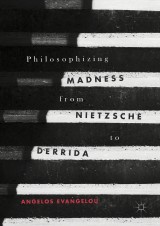Details

Philosophizing Madness from Nietzsche to Derrida
|
CHF 130.00 |
|
| Verlag: | Palgrave Macmillan |
| Format: | |
| Veröffentl.: | 12.08.2017 |
| ISBN/EAN: | 9783319570938 |
| Sprache: | englisch |
Dieses eBook enthält ein Wasserzeichen.
Beschreibungen
<p>Drawing connections between madness, philosophy and autobiography, this book addresses the question of how Nietzsche's madness might have affected his later works. It also explores why continental philosophy after Nietzsche is so fascinated with madness, and how it (re)considers, (re)evaluates and (re)valorizes madness. To answer these questions, the book analyzes the work of three major figures in twentieth-century French philosophy who were significantly influenced by Nietzsche: Bataille, Foucault and Derrida, examining the ways in which their responses to Nietzsche’s madness determine how they understand philosophy as well as philosophy’s relation to madness. For these philosophers, posing the question about madness renders the philosophical subject vulnerable and implicates it in a state of responsibility towards that about which it asks. Out of this analysis of their engagement with the question of madness emerges a new conception of 'autobiographical philosophy', which entails the insertion of this vulnerable subject into the philosophical work, to which each of these philosophers adheres or resists in different ways.</p>
<p>Chapter 1: The ‘Nietzsche Event’: Madness and the Limits of Becoming.- Chapter 2: Georges Bataille: Madness and the ‘Ethics of Vulnerability’.- Chapter 3: Michel Foucault: Madness and Philosophical Incapacity.- Chapter 4: Jacques Derrida: Philosophy Opens Up to Madness.- Conclusion: Responding to Madness: ‘Autobiographical Philosophy’.</p>
Angelos Evangelou is Associate Lecturer in Comparative Literature at the University of Kent, UK. His other publications include works on Bataille and the ‘ethics of violence’, the aesthetic of the “mad” and the problem of empathy in Anna Kavan. His current research project is in border studies and Cypriot literature.
Drawing connections between madness, philosophy and autobiography, this book addresses the question of how Nietzsche's madness might have affected his later works. It also explores why continental philosophy after Nietzsche is so fascinated with madness, and how it (re)considers, (re)evaluates and (re)valorizes madness. To answer these questions, the book analyzes the work of three major figures in twentieth-century French philosophy who were significantly influenced by Nietzsche: Bataille, Foucault and Derrida, examining the ways in which their responses to Nietzsche’s madness determine how they understand philosophy as well as philosophy’s relation to madness. For these philosophers, posing the question about madness renders the philosophical subject vulnerable and implicates it in a state of responsibility towards that about which it asks. Out of this analysis of their engagement with the question of madness emerges a new conception of 'autobiographical philosophy', which entails the insertion of this vulnerable subject into the philosophical work, to which each of these philosophers adheres or resists in different ways.<p></p>
<p>Presents new perspectives on the work of Nietzsche, Bataille, Foucault and Derrida</p><p>Offers a unique understanding of the many facets of madness and philosophy</p><p>Opens up philosophical thought to autobiographical intervention</p><p>Includes supplementary material: sn.pub/extras</p><p>Includes supplementary material: sn.pub/extras</p>
“A thoughtful examination of madness as a philosophical metaphor, asking how engagement with the autobiographical writings of prominent philosophers—Nietzsche, Bataille, Foucault, Derrida—might change the way we read their respective theories of conscience, lucidity, accountability and doubt.” (Ted Hiebert, University of Washington Bothell, USA) <p>“By way of Nietzsche, Derrida, and Bataille, Evangelou’s remarkable work attempts to demonstrate what a properly philosophical and ethical response to madness might be, with and beyond Foucault. An extremely important book for anyone interested in the relation between philosophy, work, life, and insanity.” (Michael Lewis, Teaching Fellow in Philosophy, Newcastle University, UK)</p>
Diese Produkte könnten Sie auch interessieren:

Karl Schuhmann, Selected papers on phenomenology

von: Karl Schuhmann, Cees Leijenhorst, Piet Steenbakkers

CHF 177.00















